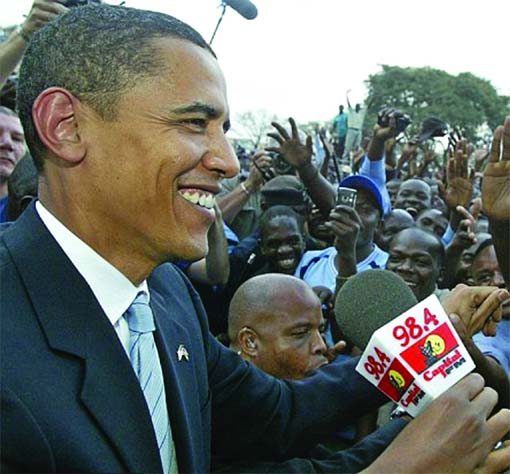
The Wall Street Journal , NAIROBI :Introducing himself as the U.S.’s first Kenyan-American president, Barack Obama sought to use his unlikely success story and personal ties to his father’s homeland to inspire a country he described as “at a crossroads.”Mr. Obama, in a speech on Sunday before several thousand Kenyans at an indoor sports arena, said Kenya is caught between intensifying security concerns over the spread of terrorism and the promise of a democracy with increasing economic opportunities.”I’m here as a friend who wants Kenya to succeed,” Mr. Obama said. Mr. Obama, who has largely left focusing on Africa policy to his second term, said the U.S. would increasingly partner with Kenya on economic and security issues. At the same time, he outlined a broader vision for how he hopes Kenya could progress, rooted in internal changes to the country’s political and economic culture.President Obama stressed better treatment for gays and lesbians in Africa while standing alongside Kenyan President Uhuru Kenyatta during a joint news conference on Saturday. In the signature speech of his long-awaited, two-day visit to the nation where his father was born, Mr. Obama cited rooting out government corruption, expanding human rights and creating a society more inclusive of women and girls as critical to the country’s future.”Imagine you have a team, and you don’t let half the team play-that’s stupid,” he said, referring to the traditional treatment of women and girls in African cultures. “Just because something is part of your past doesn’t make it right,” Mr. Obama said. “It doesn’t mean it defines your future.” Mr. Obama was introduced by his Kenyan half sister, Auma Obama. As he has been introduced publicly throughout his time in Kenya, she called him by his full name: Barack Hussein Obama.”He gets us,” she said. “He’s one of us.” Much of the crowd were students invited to hear Mr. Obama’s message of youth empowerment. Michael Amol, a 23-year-old university student, said Mr. Obama “talked about the real issues we are dealing with.” He said Kenyan leaders don’t usually talk so frankly about corruption or Kenya’s tribal divides.”The youth have been used by the political elite for their gains but when it comes to solid advice, they have nothing.” Asked if Obama had any solid advice, he said, “Yes-I should not let my background dictate what my future will be.” Mr. Obama is set to travel to Ethiopia later Sunday. The crossroads Mr. Obama said Kenya is at was inherent in his choice of venue for his speech, which was the closest he had come during the trip to interacting with regular Kenyans. The president spoke at an arena inside the sports complex where the Kenyan government held more than 1,000 ethnic Somalis in April 2014 during a weeklong security crackdown sparked by a grenade attack in the predominantly Somali neighborhood of Eastleigh.After the grenade explosion-which killed six people-Kenyan security forces descended on the neighborhood often called “Little Mogadishu” and piled men, women and children into trucks. People were taken to police holding cells until those filled up and then police started using the stadium as an impromptu detention center.More than 4,000 people were detained countrywide and more than 80 people deported. There haven’t been any such large-scale roundups since, but Somalis in Nairobi say they continue to suffer harassment from police and arrests without cause.The Kenyan government, for its part, has said that its arrests have been part of a necessary push to improve security among a community known to harbor illegal migrants and people with connections to Somali militant group al-Shabaab. Mr. Obama urged Kenya to resist the tendency to crack down on certain populations when faced with security threats. He also called on Kenyans to “break the cycle” of government corruption, a lingering problem across Africa. “It’s an anchor that weighs you down and prevents you from achieving what you could,” Mr. Obama said. “Ordinary people have to stand up and say ‘enough is enough.'” Many of the attendees said the mention about corruption hit closest to home for them.”If you’re not known, if you don’t have money. Then there is no opportunity for you,” said 21-year-old student Timothy Mutinda. “Corruption is really pulling us back.” And while Mr. Mutinda said he felt Mr. Obama was a “son” of Kenya, it was the U.S. president’s role as an outsider that made the point that much stronger: “If you are challenged by someone exterior, you’ll have to change it.”After Mr. Obama exited the arena, crowds who had arrived as early as 7 a.m. poured out into the midday sun. Some had private cars waiting, some boarded large buses and scores of others also walked out to the main road to catch public transport, some waving flags and singing as they went.

